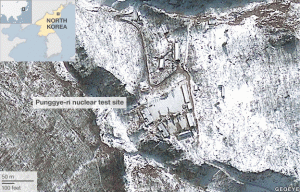UNITED NATIONS — Reflecting the importance of the ongoing efforts to prevent nuclear non-proliferation, the Security Council has reaffirmed its tough stance against the development and transfer of technical components among “non-state actors,” namely terrorist groups, to produce nuclear, chemical and biological weapons of mass destruction.
South Korea, who holds the monthly presidency of the fifteen-member Council, hosted a high level debate commemorating the tenth anniversary of landmark resolution #1540. This resolution created the legal framework to stem the flow of technology to terrorist groups and rogue regimes.
 A statement by the president affirmed; “The Security Council remains gravely concerned by the threat of terrorism, and the risk that non-state actors may acquire, develop, traffic in or use, nuclear, chemical and biological weapons and their means of delivery.”
A statement by the president affirmed; “The Security Council remains gravely concerned by the threat of terrorism, and the risk that non-state actors may acquire, develop, traffic in or use, nuclear, chemical and biological weapons and their means of delivery.”
Chairing the session, South Korea’s Foreign Minister Yun Byung-se stated, “Today, the weakest link in nuclear non-proliferation, along with nuclear security and safety, is exposed by North Korea’s nuclear weapons programs.”
He added poignantly, “The DPRK is the only country in the world that has conducted nuclear tests in the 21st century.”
In the light that Pyongyang rulers are threatening a fourth nuclear test, Minister Yun warned, “If North Korea succeeds in acquiring nuclear weapons, it will seriously undermine the NPT (Nuclear Non-Proliferation) regime and will exasperate tension and instability in Northeast Asia.”
Clearly a decade ago the proliferation problem appeared daunting. According to Terry Taylor, a UN official who played a key part in the original resolution; “9/11 led to resolution 1540”. In the aftermath of the terrorist attacks on American soil in 2001, “there were at least thirty non-state actors” including Pakistan’s infamous A Q Khan network who were involved in transport and research in WMD’s.
Diplomatic briefing papers outline the challenge; “In today’s globalized world, connectivity has brought both opportunities and vulnerabilities. Increased potential access to weapons of mass destruction (WMD) and their related materials and technology has heightened the risk of the dangerous nexus between weapons of mass destruction and global terrorism.
Given this gripping reality, “the Security Council unanimously adopted resolution 1540 under Chapter VII of the UN Charter in 2004.” A key element of the resolution prohibits States from, “supporting non-state actors from developing, acquiring, manufacturing, possessing, transporting, transferring, or using them.”
As South Korean Ambassador Oh Joon told correspondents earlier, “Resolution 1540 is about anti-terrorism and non-proliferation.” He stressed, “This is not a sanctions committee,” but yet there are binding obligations on member states.
Amb. Gary Quinlan of Australia underscored, “As we all know, only too starkly, the threat of terrorist groups acquiring and using weapons of mass destruction (WMD’s) is not a hypothetical or abstract one.”
In fact in the decade since its passage, there has been good compliance; 172 countries out of the 193 in the UN membership have voluntarily presented reports to the 1540 Committee. Shortfalls in participation are noteworthy however, with a number of African states not participating. As to the veracity of all data presented there is no foolproof standard. Indeed, much of the effort is focused on effective border and shipping controls.
Not surprisingly North Korea, has not shared data on what is known to be its widespread nuclear weapons proliferation effort inside Kim Jong-Un’s hermit kingdom.
“The world is more dangerous than ever before. From smartphones to smart bombs, technology has made it easier for terrorists to inflict mass destruction,” lamented Israel’s delegate, Ron Prosor.
As Minister Yun advised delegations, “We must clearly warn North Korea that if it challenges the international community with another nuclear test, it will be met with the most serious consequences.”
We can certainly hope so.
John J. Metzler is a U.N. correspondent covering diplomatic and defense issues. He writes weekly for WorldTribune.com. He is the author of Transatlantic Divide ; USA/Euroland Rift (University Press, 2010).


You must be logged in to post a comment Login